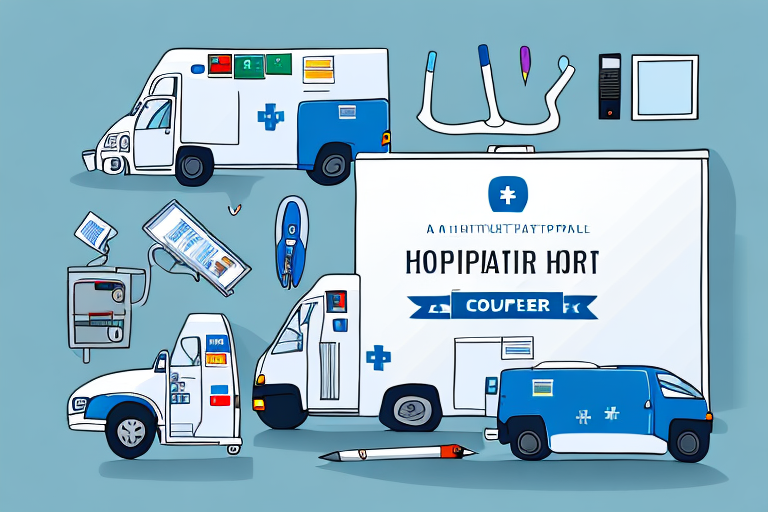Importance of Hospital Courier Services
Hospitals and healthcare facilities rely on the timely and efficient delivery of medical supplies, equipment, specimens, and documents. Utilizing a professional hospital courier service offers numerous advantages to healthcare providers, patients, and staff, ensuring smooth operations and enhanced patient care.
Why Hospitals Need Courier Services
Hospitals employ various types of couriers, including in-house and third-party services. In-house couriers are dedicated staff responsible for internal deliveries, such as lab specimens or medications. Conversely, third-party courier services specialize in transporting items between different healthcare facilities, including labs, clinics, and other hospitals.
Effective courier services are essential for maintaining the quality and integrity of medical goods while minimizing turnaround times. Ensuring that critical documents, blood samples, and pharmaceuticals reach their destinations promptly can significantly impact patient outcomes and save lives.
Moreover, outsourcing courier services can lead to cost savings by reducing the need for hospital staff to manage transportation tasks, allowing them to focus more on patient care. Real-time tracking and monitoring provided by courier services also enhance inventory management, ensuring that essential items are always available when needed.
The Importance of Timely Deliveries in Healthcare
Timely delivery of medical goods is crucial in healthcare as it directly affects patient outcomes, diagnosis, and treatment effectiveness. Delays in delivering items like lab results, blood transfusions, and medications can hinder the ability of healthcare providers to make informed decisions swiftly.
Financially, timely deliveries help reduce waste by preventing the expiration of medications and spoilage of lab samples, thereby saving healthcare organizations significant resources. Efficient delivery systems contribute to better resource allocation and overall operational effectiveness.
How Hospital Courier Services Operate
Professional hospital courier services operate around the clock, offering both on-demand and scheduled pickup and delivery options. They provide a range of transportation methods, including bicycles, cars, vans, and trucks, tailored to the size and urgency of each delivery.
How a Hospital Courier Service Works
Hospital courier services employ advanced tracking systems, such as GPS, to monitor packages in real-time, ensuring transparency and security throughout the delivery process. This allows healthcare providers to know the exact status and location of their shipments at any given time.
Specialized handling protocols are in place for sensitive items like laboratory samples, blood products, and pharmaceuticals. Couriers receive training to manage temperature-sensitive and biohazard materials, ensuring that these critical items are transported safely without compromising their integrity.
The Role of Technology in Hospital Courier Services
Advanced technology plays a pivotal role in optimizing courier operations. Custom software solutions and automated routing systems help couriers minimize delays and optimize delivery routes, enhancing overall efficiency.
Cloud-based platforms provide healthcare staff with real-time access to delivery statuses, reducing the risk of errors and improving communication between parties. Additionally, some courier services are exploring the use of drones for delivering medical supplies, which could further reduce delivery times and bypass traffic-related delays, although regulatory and safety challenges remain.
Outsourcing vs In-House Courier Services
Healthcare facilities must decide between maintaining in-house courier teams or outsourcing to specialized third-party services. Each option has its own set of advantages and considerations.
Benefits of Outsourcing Hospital Courier Services
Outsourcing courier services can offer significant cost savings by eliminating the need for hospitals to invest in dedicated staff, vehicles, and logistics management. Third-party services bring specialized expertise and resources, often resulting in more efficient and reliable deliveries.
Flexible pricing models, such as per delivery or monthly contracts, allow hospitals to manage costs effectively based on their specific needs. Additionally, outsourced services can quickly scale operations to handle varying demands without disrupting internal processes.
A Comparison of In-House vs Outsourced Hospital Courier Services
While in-house courier services offer control and immediate availability, outsourcing provides greater flexibility, cost efficiency, and access to advanced technologies. Third-party couriers often have comprehensive tracking and reporting systems that enhance delivery accuracy and reliability, which may not be feasible with in-house operations.
Outsourcing also allows hospitals to benefit from the specialized handling of sensitive medical items and compliance with industry regulations, ensuring safe and secure transportation.
Cost-Effectiveness of Hospital Courier Services
Outsourcing courier services can be more cost-effective compared to maintaining an in-house team. Third-party providers have the infrastructure, expertise, and economies of scale to deliver services at a lower overall cost.
Hospitals can choose from various pricing options, such as per delivery or monthly contracts, which offer flexibility and can be tailored to their specific needs. Additionally, the reduction in overhead expenses, including salaries, benefits, and vehicle maintenance, contributes to significant cost savings.
Enhanced efficiency through advanced tracking systems and optimized delivery routes further reduces operational costs, allowing hospitals to allocate resources more effectively toward patient care.
Enhancing Patient Care with Courier Services
Reliable and efficient courier services play a crucial role in improving the quality of patient care by ensuring the timely delivery of critical items.
How Hospital Courier Services Improve Patient Care
By transporting medical specimens and samples swiftly and securely, courier services enable timely diagnoses and treatment. This is especially important for time-sensitive tests, such as those for infectious diseases or cancer, where delays can adversely affect patient health outcomes.
Courier services also facilitate seamless communication between healthcare providers by delivering important documents, including patient records and test results, to the appropriate departments or specialists. This streamlined process ensures that all members of the healthcare team have access to the necessary information to provide optimal care.
Overall, efficient courier services contribute to better patient experiences and outcomes by ensuring that medical supplies and information are available when needed.
Best Practices and Challenges
To maximize the benefits of hospital courier services, it is essential to implement best practices while addressing common challenges effectively.
Best Practices for Hiring a Reliable Hospital Courier Service Provider
- Reputable Company: Choose a courier service with a strong track record of reliability and experience in handling medical deliveries.
- Specialized Handling: Ensure the provider is adept at managing sensitive materials, including adherence to regulations and proper training.
- Timely Pickups and Deliveries: Verify that the service can meet your scheduling needs consistently.
- Effective Communication: Maintain clear and open lines of communication between the hospital and the courier provider.
Common Challenges Faced by Hospital Courier Services and Solutions to Overcome Them
Hospital courier services often encounter challenges such as traffic delays, lost packages, and communication breakdowns with healthcare providers. Implementing robust risk management strategies can mitigate these issues:
- Real-Time Tracking: Utilize GPS and tracking systems to monitor deliveries and provide real-time updates.
- Customer Service: Establish dedicated hotlines and support channels for prompt issue resolution.
- Proper Documentation and Insurance: Maintain comprehensive records and appropriate insurance coverage to handle lost or damaged packages.
- Specialized Training: Invest in training staff to handle medical equipment and comply with safety protocols.
Adhering to strict healthcare regulations, such as HIPAA for patient information privacy, is also critical to maintaining compliance and avoiding legal repercussions.
Future Trends and Innovations
The hospital courier industry is continually evolving with advancements in technology and changing healthcare needs. Staying ahead of these trends ensures that courier services remain efficient and effective.
The Future of Hospital Courier Services: Trends and Innovations
Emerging technologies are set to revolutionize hospital courier services. The integration of autonomous vehicles and drones promises faster and more reliable deliveries, especially in urban areas where traffic congestion is a concern.
Customized software solutions are being developed to provide more personalized delivery options, enhancing customer satisfaction. Additionally, there is a growing emphasis on environmentally sustainable practices, such as using electric vehicles, to reduce the carbon footprint of courier operations.
Choosing the Right Transport Mode for Your Medical Deliveries: Air, Road, or Sea?
Hospital courier services offer multiple transport modes, each suited to different types of deliveries:
- Air Transport: Ideal for long-distance and urgent deliveries, ensuring rapid transit times.
- Road Transport: Best for short to medium distances and larger volumes, providing flexibility and reliability.
- Sea Transport: Suitable for international shipments, often used for bulk deliveries that are not time-sensitive.
Selecting the appropriate transport mode depends on factors such as delivery urgency, distance, and shipment volume, ensuring that medical goods reach their destination efficiently and safely.
Compliance and Case Studies
Compliance with industry regulations and understanding real-life applications of courier services highlight the critical role they play in healthcare.
The Role of Compliance and Regulations in the Healthcare Transport Industry
The healthcare transport industry is governed by stringent regulations to ensure the safe and secure handling of medical goods. Key regulations include:
- HIPAA: Protects patient information privacy during the transportation of medical documents and records.
- OSHA: Ensures safe handling practices for biohazard materials and medical equipment.
- DOT: Regulates the transportation of hazardous materials, including pharmaceuticals.
Non-compliance can result in severe legal and financial penalties, as well as jeopardize patient safety. Therefore, hospital courier services must stay updated with the latest regulations and ensure all staff are adequately trained to adhere to these standards.
Case Studies: Real-Life Examples of Hospitals that have Benefited from Using a Professional Courier Service
Numerous hospitals have experienced significant benefits by partnering with professional courier services. For example, the Cleveland Clinic collaborated with a third-party courier to reduce transportation costs, decrease the turnaround time for lab results, and enhance overall patient outcomes.
Other institutions have reported increased operational efficiency, improved customer service, and higher patient satisfaction rates after implementing professional courier solutions. These case studies demonstrate the tangible benefits of leveraging specialized courier services in the healthcare sector.
Conclusion
Hospital courier services are integral to the seamless operation of healthcare facilities. By providing efficient, reliable, and cost-effective delivery of medical goods, these services enhance patient care and contribute to better health outcomes. As technology advances and the healthcare landscape evolves, professional courier services will continue to innovate, ensuring that hospitals can meet the dynamic needs of their patients and staff.






















